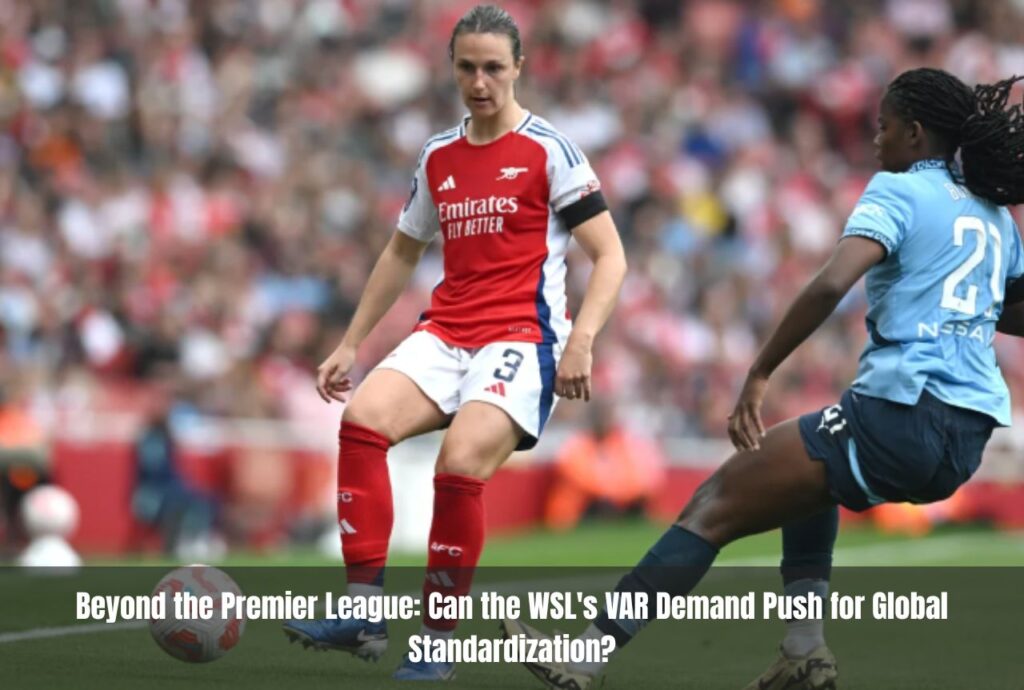Arsenal and Chelsea’s pulsating 1-1 draw became a watershed moment for refereeing standards; Stina Blackstenius’ header canceled out Aggie Beever-Jones’ opener in a match featuring three disallowed goals; with no VAR available in the Women’s Super League, both managers launched impassioned demands for technology adoption as Premier League controversies fuel global standardization debates.
Match Flow
Chelsea established early dominance through Lauren James’ dynamic midfield orchestration; their pressure crystallized in the 15th minute when Beever-Jones lashed home from eight yards after Erin Cuthbert’s persistent pressing. Arsenal responded with characteristic resilience, Frida Maanum’s pinpoint cross meeting Blackstenius’ exemplary near-post run for the 33rd-minute equalizer.
The second half erupted into controversy within six minutes of restart; Beth Mead’s clinical finish was ruled offside by assistant referee Ceri Williams’ marginal call. Chaos compounded in the 63rd minute when Alessia Russo’s header was disallowed for a perceived foul, before Chelsea’s vehement penalty appeals were dismissed following Leah Williamson’s challenge on Guro Reiten. Manuela Zinsberger’s spectacular 89th-minute save from Jelena Cankovic preserved the stalemate.
Key Moments & Turning Points
51st Minute: Mead’s disallowed strike exposed WSL’s technological limitations as replays suggested millimeter-level offside; Chelsea immediately countered through James’ defense-splitting pass to Reiten.
63rd Minute: Russo’s aerial prowess appeared decisive until referee Emily Heasley adjudged Lotte Wubben-Moy’s aerial challenge illegal; Chelsea’s protests included four players booked for dissent.
67th Minute: Williamson’s recovery tackle on Reiten became match-defining as Heasley waved play on; UEFA’s VAR protocol would have triggered an automatic review in Champions League fixtures.
Player Performance Analysis
Alessia Russo: The Arsenal striker won seven duels and completed 84% passes, her relentless movement creating constant defensive disarray despite the disallowed header.
Lauren James: Operating in a versatile false-nine role, Chelsea’s playmaker created three clear chances and completed five dribbles before being subdued by Lia Wälti’s tactical fouling.
Lia Wälti: Integral to Arsenal’s midfield structure, the Swiss international recorded 92% pass accuracy with 12 ball recoveries – her positioning nullifying James’ influence after halftime.
Renee Slegers: Arsenal’s VAR Crusade
The Dutch manager delivered her third public technology plea this season, following controversial defeats to Liverpool and Manchester City: “When you see three goals disallowed without conclusive angles, it’s embarrassing for our league. We’re asking players to be exemplary professionals but denying them professional tools.”
Slegers highlighted FIFA’s successful VAR implementation during the 2023 Women’s World Cup as proof of concept: “We saw 0.3% errors with technology versus 5.6% without in the knockout stages. The WSL needs minimum standards to maintain credibility.”
Sonia Bompastor: Chelsea’s Refereeing Reform Call
Chelsea’s new boss struck a diplomatic tone while demanding urgent progress: “This was a riveting derby – let’s talk about the football, not the refereeing. But to achieve that, we need technology supporting our officials in decisive moments.”
Bompastor proposed adopting NWSL’s VAR-lite model – where only one video operator reviews key incidents: “Selective implementation could be an affordable interim solution. World-class players deserve world-class officiating infrastructure.”
League Context & Global Implications
The WSL stands isolated as Europe’s sole elite women’s competition without VAR; France’s D1 Arkema and Germany’s Frauen-Bundesliga adopted full systems in 2022. FIFA’s Head of Women’s Football Sarai Bareman, confirmed monitoring the situation, telling ESPN: “Consistency across leagues is vital for World Cup preparation.”
Premier League’s chaotic VAR reputation – exemplified by Liverpool’s Luis Diaz offside scandal – complicates adoption debates. However, WSL managers argue basic technology would represent progress: “Nobody expects perfection overnight,” Slegers noted, “but zero technology in 2024 is indefensible.”
NWSL’s hybrid approach offers financial pragmatism; using one video reviewer per match costs approximately $8,000, versus the Premier League’s $72,000 per game full-staff model. UEFA’s commitment to VAR in all Women’s Champions League fixtures increases pressure on English authorities ahead of 2025 hosting duties.
Frequently Asked Questions
Should VAR be used in the Women’s Super League?
Arsenal and Chelsea managers publicly demanded VAR after multiple controversial decisions in their 1-1 draw, citing the need for professional standards.
Does the WSL currently use VAR technology?
No – the Women’s Super League remains Europe’s only top-tier women’s competition without VAR despite its use in UEFA competitions and the Women’s World Cup.
What did Arsenal’s manager say about WSL refereeing?
Renee Slegers called decisions ’embarrassing’ after three disallowed goals, stating: ‘World-class players deserve world-class officiating with proper technology.’
How does Premier League VAR controversy affect WSL demands?
While the Premier League faces criticism for VAR implementation flaws, WSL managers argue basic video review would represent significant progress for women’s officiating.





Leave a Reply